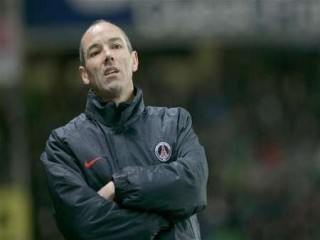
Paul Le Guen biography
Date of birth : 1964-03-01
Date of death : -
Birthplace : Pencran, France
Nationality : French
Category : Sports
Last modified : 2010-05-04
Credited as : Footballer, Cameroon national team, World Cup
0 votes so far
Le Guen had a successful managerial career in France, most notably leading Olympique Lyonnais to three consecutive Ligue 1 titles. He has also managed Stade Rennais and had an unsuccessful brief spell at Rangers in Scotland. During his playing career he enjoyed successful stays with FC Nantes and Paris St. Germain and won 17 caps for the French national team.
Player career
Club
During his playing career, Le Guen played at Stade Brest for six years, Nantes Atlantique) for two years, before leaving Brittany for Paris St. Germain where he played for seven years (with 478 appearances and a Cup Winners' Cup medal in 1996).
International
At international level he played 17 times for France due to injuries and he was part of the team which lost out on a trip to the World Cup in 1994, along with Eric Cantona and David Ginola. He ended his playing career by taking part in a friendly where his home region of Brittany faced Cameroon on 21 May 1998. The match finished 1–1.
Manager career
Rennes
During his time at Rennes between 1998 and 2001, Le Guen was noted for signing then unknown players, such as Shabani Nonda and El Hadji Diouf, who under his guidance, developed into talented footballers. He resigned from Rennes in 2001 after a fall-out with the club's board. This led to him taking a year off from football.
Lyon
Le Guen replaced Jacques Santini as manager of Olympique Lyonnais in 2002 after they captured their first league title. Le Guen experienced a grim start to his managerial career at Lyon, winning only 3 games of the first 9, but eventually took Lyon to a further three consecutive championships and reached the UEFA Champions League quarter-final. He resigned from his position at Lyon on 9 May 2005, the day after the club won their fourth consecutive Ligue 1 championship. He was replaced by Gérard Houllier.
After leaving the club, Le Guen embarked upon another year away from football management. During this time he turned down management positions at several top European clubs including Benfica and Lazio and also stated that he would not return to manage his former club PSG.
Rangers
On 11 March 2006, it was confirmed that Paul Le Guen had agreed to replace Alex McLeish as manager of Rangers starting in the 2006–07 season. Rangers chairman David Murray predicted Le Guen's capture would be followed by "a massive moonbeam of success" coming to the club. Le Guen signed a three-year contract with the option to extend his stay at Ibrox, and quickly acquired a number of players.
However, Le Guen made a poor start to his Ibrox career. His record across his first ten league games was the worst start to a season by an Old Firm debutant since John Greig's team won only two, drew six and lost two of their opening ten games in 1978–79.
On 8 November, Rangers were knocked out of the Scottish League Cup at the quarter-final stage by First Division side St. Johnstone. The result, the first time Rangers had been knocked out of a cup tournament by a lower league side at home, prompted protests outside Ibrox and demands for the situation to improve and David Murray to leave the club.
On 1 January 2007, Rangers announced that Le Guen had stripped Barry Ferguson of his captaincy of the club and dropped him from the squad for a match the following day. BBC Sport reported that Ferguson would not play for Rangers again under Le Guen.
Murray announced on 4 January 2007 that Paul Le Guen had left Rangers by mutual consent. This made him the club's shortest-serving manager, and the only one to leave the club without completing a full season in charge.
Later that year, sports journalist Graham Spiers published, Paul Le Guen: Enigma (ISBN 1845962915) documenting his tenure at the club. According to Spiers, Le Guen left the club because he felt he was being "undermined" by other Rangers personnel, including Ferguson and then club doctor, Ian McGuinness, although Spiers also states that, "For his part, McGuinness was entitled to believe that he was being treated shabbily".
Paris Saint Germain
It was announced on 15 January 2007 that Le Guen would return to the club he once skippered as a player as first team coach replacing Guy Lacombe at Paris Saint Germain. When he arrived, PSG were lying 17th in Ligue 1 but he led them to safety in his 1st season finishing 15th. As the 2007–08 season in Ligue 1 unfolded, it was clear that Le Guen was getting inconsistent performances from the crop of players, as the club was in the relegation zone with four games in the league season remaining, while winning the Coupe de la Ligue and qualifying for the final of the Coupe de France. Winning the Coupe de la Ligue guaranteed PSG a place in the UEFA Cup for the 2008–09 season. PSG announced in May 2009 that Paul Le Guen would not be offered a new contract and would leave at the end of the 2008–09 season.
Cameroon national football team
He was named Cameroon national football team manager in July 2009, signing a five month contract. He made an immediate impact by leading the team to qualification for the 2010 World Cup in South Africa. He also stripped veteran defender Rigobert Song of the captaincy and appointed Samuel Eto'o as the new captain. Both players responded well to the change with Eto'o getting goals, and Song winning back his starting spot as the Lions qualified for the finals.
















